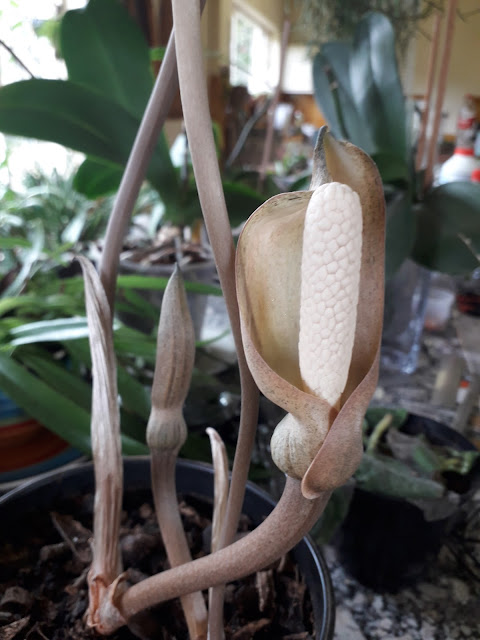Syzygium cordatum is very much the dominant tree in this area growing not only in the eMalangeni forest and forest margins but as bush clumps throughout the grasslands in the immediate proximity to the Kosi Bay complex where it no doubt plays an important role in the ecosystems where it grows.
A mature Syzygium cordatum growing on the forest edge at the eMalangeni Forest in the Kosi Bay Complex on the north east coast of South Africa
The tree Syzygium cordatum locally known as umdoni in the Zulu language and water berry in English belongs to the same plant family Myrtaceae as the common guava, Psidium guajava.
Syzygium cordatum trees are favoured by many epiphytes in
particular the indigenous epiphytic orchid, Cyrtanthus arcuata that in many
areas grows exclusively on these trees.
In the bush clumps in the surrounding grassland dominated by
Syzygium cordatum trees there is a particular relationship between the Syzygium
cordatum tree, the Kosi Bay cycad Encephalartos ferox that grow underneath them
and the Trumpeter Hornbill Bycanistes buccinator that eats the seeds of the
Cycad and deposits the seeds under the Syzygium trees where they can be found
grown in great numbers.
Description
Syzygium cordatum is a water
loving evergreen single or multi-stem tree, which grows to a height of 8 -15 m
being larger in forest and much smaller in open grassland. The leaves are
elliptic to circular, bluish green on top and a paler green below. Young leaves
are reddish. The specific name cordatum is from the Latin word cordatus,
meaning 'heart-shaped', referring to the shape of the base of the leaf.
Flowers
Syzygium cordatum has white to pinkish fragrant flowers that
produce abundant nectar are borne in branched terminals and have numerous
fluffy stamens. produce abundant nectar flowers from August to November.
The flower of syzygium cordatum growing at the eMalangeni Forest
Fruit
The fruits of Syzygium cordatum are oval berries dark-purple
when ripe.
Distribution and habitat
The distribution of Syzygium cordatum is from the Eastern Cape through KwaZulu-Natal and northwards to Mozambique, Caprivi Strip and Northwards to include Kenya where it grows in swamp forest, forest, forest margins, in bush, in riverine thicket and, and in wet open grassy areas.
Ecology
The flowers of Syzygium cordatum produce much nectar that attracts bees and other insect pollinators.
Syzygium cordatum is by far the favourite tree for the epiphytic orchid Cyrtorchis
arcuata to grow on.
Syzygium cordatum is a food plant for larvae of the Apricot Playboy
(Deudorix dinochares). These butterfly larvae feed on the Seeds within the
pods. Kudu, Nyala, and Duiker eat the Leaves The emperor moths (Micragone cana)
feed on the leaves. Their caterpillars are collected for food by the locals.
Crowned Hornbills are attracted to the caterpillars that occasionally infest the tree.
Syzygium cordatum is fire resistant.
Uses
Syzygium cordatum has many uses. The astringent fleshy
fruit of Syzygium cordatum is edible, slightly acid in flavour, is eaten by
children and adults, monkeys, bush-babies and birds. The berries are also used
to make an alcoholic wine like drink. The powdered bark is used as a fish
poison. In central Africa the tree is known as a remedy for stomach ache and
diarrhoea. It is also used to treat respiratory ailments and tuberculosis.
The wood is light reddish brown to grey, works easily, is very
durable in water which makes it exceptionally good for boat building. The wood smoke
which is pleasantly aromatic is used to cure milk gourds
A purple dye made from the fruit is used to dye material
used in weaving and basketmaking, the bark makes a red brown dye.
Good quality honey can be produced from the Flowers.
Guided excursions
Guided excursions in English, Zulu and German into the eMalangeni Forest and surrounding area including the nearby Tembe Elephant Park can be arranged. Please visit my websites for contact details.
Written by Michael Hickman on 1April 2021
please visit my websites
as well as my other blogs at
http://luthulienvironment.blogspot.com/
http://ecomandurban.blogspot.com/


















